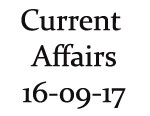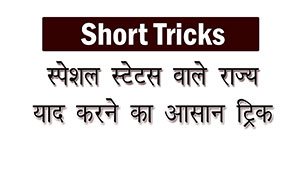-
Current Affairs 16th September 2017
Updated : 16-Sep-2017
Current Affairs 16th September 2017 - Important Points
- 'Maharashtra Mission 1 Million' initiative launched by - Devendra Fadnavis
- Union Government to grant citizenship to Chakma and Hajong refugees in - September 2017
- Shape-shifting bacteria found by - NASA
- India, China growth status in - UNCTAD Report 2017
- Swachhta hi Seva Campaign launched by - President of India
Current Affairs 16th September 2017 - Details
'Maharashtra Mission 1 Million' initiative launched by - Devendra Fadnavis
Maharashtra Chief Minister Devendra Fadnavis launched the ‘Maharashtra Mission 1 Million’ initiative on 15th September 2017 under which more than 10 lakh students across the state will be playing football. This mission was launched in an attempt to support the FIFA Under 17 World Cup, starting for the first time ever in Maharashtra, India.
The under-17 football world cup is set to start in October 2017. According to Devendra Fadnavis , the mission will not only be creating football players and game lovers, but will also be helping in overall development of the state.
In this initiative, the state government is aiming to ensure that children come out in open spaces and play football. On the occasion, Fadnavis himself kicked the ball for a brief while at the Bombay Gymkhana in the presence of State Sports minister, Vinod Tawde. The state government also distributed 1 lakh footballs in over 30 thousand schools.More about FIFA U17 World Cup
- The tournament would be including a total of 52 matches.
- The matches would be held at 6 cities across India including Kochi, Kolkata, New Delhi, Navi Mumbai, Goa, and Guwahati.
Union Government to grant citizenship to Chakma and Hajong refugees in - September 2017
The Government of India has decided to grant Indian citizenship in September 2017 to nearly one lakh Chakma and Hajong refugees, who came from the erstwhile East Pakistan five decades ago.
The Chakma and Hajong refugees live in camps in the Northeast India at present.
The move came following an order of the Supreme Court, which in 2015 had directed the Union Government to grant citizenship to the Chakma and Hajong refugees, mostly staying in Arunachal Pradesh.More about Chakma and Hajong refugees
- The Chakmas are an ethnic group mainly scattered in Assam, Mizoram, Arunachal Pradesh, Tripura, Meghalaya and West Bengal of India and in Chittagong Hill Tracts of Bangladesh.
- The Chakmas are divided into 46 clans. They have their own language, customs and culture, and profess Theravada Buddhism.
- These Hajong people are tribal people of North-eastern Bengal and India.
- Hajong people are spread out across North East India, West Bengal and Bangladesh. Among them, Majority of the Hajongs are settled in India.
- Hajong mainly have the Scheduled Tribe status in India.
- The Chakmas faced religious persecution along with the Hajongs in East Pakistan, who are Hindus.
- Out of those who reached India, many among them were Chakmas and only 2000 were Hajong.
- The groups entered to India through what was then the Lushai Hills district of Assam also called Mizoram.
- While some stayed back with Chakmas who were already living in Lushai Hills, but still the Indian government moved a majority of the refugees to Arunachal Pradesh till date.
Shape-shifting bacteria found by - NASA
The ISS (International Space Station) has uncovered in a report that microscopic organism’s bacteria “shapeshift" in space to counteract any harm to itself. Experiments on the ISS has been undergoing for a long while to see the response of microscopic organisms under different conditions. ISS observed that the bacterial cells when treated with a common antibiotic, changing its shape to survive in near to zero gravity environments.
Important Highlights
- It may pose a serious threat to astronauts getting treated for the infections.
- This "clever shape-shifting" detected when it experimented on ISS in the near-weightlessness of space and is believed to help the bacteria to survive.
- The bacteria can also contaminate space travelers, and this antibiotic can be utilized against the danger, yet with regularly advancing micro-organisms, the resistance will be snappier with higher success rate to our anti-toxins.
- This can also prompt to normal infections becoming severe and savage for individuals making a trip to the space.
- Researchers have also realized that microscopic organisms act distinctively in space contrasted with their conduct up to this point on Earth.
- It took greater elevated amount of anti-toxins for similar Earth-like diseases. There was no concrete known purpose behind it and now, scientists are revealing the reasons gradually.
Important facts about this research:- Luis Zea led the group of researchers from the University of Colorado, Boulder, in US.
- They sent E coli tests up to the ISS(International Space Station) to discover how microbes carry on in the microgravity space states.
- With the information got from that examination, the group could analyze the impacts of anti-toxin gentamicin sulfate specifically.
- There was a 13-fold increment in the E coli cell numbers and a decrease of 73% in cell size after the anti-toxin was administered.
- The cells of bacteria created thicker cell walls and membranes.
India, China growth status in - UNCTAD Report 2017
Demonetisation imapcts and rollout of the GST administration on the informal sector and diminishment in the credit creation pace may influence India's development prospect. As a result, the Indian Economy is at a slippery slope resulting to make India unlikely to serve as a “Growth Pole” for the World in the near future as per the United Nations Conference on Trade and Development-UNCTAD’s Trade & Development report 2017.
This Trade & Development report is a flagship report of the UNCTAD evaluating the global economic climate. As per the report the growth in the world’s two most populous economies of India and China, remains moderately buoyant, yet the pace is comparatively slower and they are at risk to face some serious risk.
Report about India:
- It anticipated that the Indian Economy is slowing down to 6.7% in this year than the 7% an year ago.The Report further added that the informal sector in India, which records for 33% of the nation's GDP and more than four-fifths of employment, was seriously affected by the "demonetisation" move in November 2016, and it might be additionally affected by the rollout of the GST (Goods & Services Tax) imposed with effect from July 2017.
- In this way, regardless of the possibility that the present growth levels in both China and India are maintained, it is not possible that these nations will be filling in as growth poles for the worldwide economy sooner rather than later.
- The UNCTAD report 2017 said that increasing Non-Performing Assets of banks are also impacting their lending practices.
- The Indian Bank Sector since 2003 has extended credit to the retail segment for housing investment, auto-buys and to the corporate for various projects in the infrastructure and is presently troubled with a vast volume of NPAs and stressed loans and there are now indications of a reduction in the pace of credit creation.
Swachhta hi Seva Campaign launched by - President of India
To take the Swachh Bharat Abhiyan at a higher level, The President of India,Shri Ram Nath Kovind
launched a nationwide sanitation campaign, ‘Swachhta hi Seva’ (Cleanliness is Service), at Ishwariganj village in Kanpur on September 15th, 2017. The President also administered ‘Swachhta hi Seva’ oath to all who were present there whereby they pledged to create a healthy and clean new India.This ‘Swachhta hi Seva’ campaign is aiming to strengthen the flagship program ‘Swachh Bharat Mission’.
After the launch of this campaign, the President also honoured village-level champions who contributed to make Ishwariganj village ‘Open Defecation Free’. The President also launched the Solid and Liquid Waste Management activities in the village which is also the next major step in Swachhta after getting the villages Open Defecation Free.Before launching this campaign, the President addressed the people out there and stated that India is on a war for Healthy and clean India. He also stressed on the responsibility to make India clean on not only the sanitation personnel but on the entire country.














